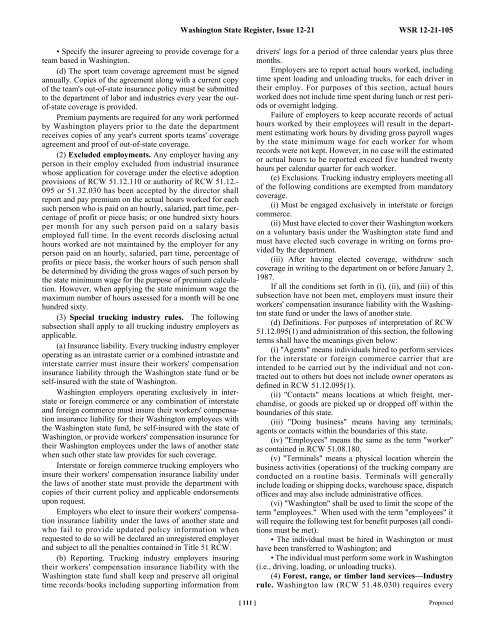Proposed
Proposed
Proposed
Create successful ePaper yourself
Turn your PDF publications into a flip-book with our unique Google optimized e-Paper software.
• Specify the insurer agreeing to provide coverage for a<br />
team based in Washington.<br />
(d) The sport team coverage agreement must be signed<br />
annually. Copies of the agreement along with a current copy<br />
of the team's out-of-state insurance policy must be submitted<br />
to the department of labor and industries every year the outof-state<br />
coverage is provided.<br />
Premium payments are required for any work performed<br />
by Washington players prior to the date the department<br />
receives copies of any year's current sports teams' coverage<br />
agreement and proof of out-of-state coverage.<br />
(2) Excluded employments. Any employer having any<br />
person in their employ excluded from industrial insurance<br />
whose application for coverage under the elective adoption<br />
provisions of RCW 51.12.110 or authority of RCW 51.12.-<br />
095 or 51.32.030 has been accepted by the director shall<br />
report and pay premium on the actual hours worked for each<br />
such person who is paid on an hourly, salaried, part time, percentage<br />
of profit or piece basis; or one hundred sixty hours<br />
per month for any such person paid on a salary basis<br />
employed full time. In the event records disclosing actual<br />
hours worked are not maintained by the employer for any<br />
person paid on an hourly, salaried, part time, percentage of<br />
profits or piece basis, the worker hours of such person shall<br />
be determined by dividing the gross wages of such person by<br />
the state minimum wage for the purpose of premium calculation.<br />
However, when applying the state minimum wage the<br />
maximum number of hours assessed for a month will be one<br />
hundred sixty.<br />
(3) Special trucking industry rules. The following<br />
subsection shall apply to all trucking industry employers as<br />
applicable.<br />
(a) Insurance liability. Every trucking industry employer<br />
operating as an intrastate carrier or a combined intrastate and<br />
interstate carrier must insure their workers' compensation<br />
insurance liability through the Washington state fund or be<br />
self-insured with the state of Washington.<br />
Washington employers operating exclusively in interstate<br />
or foreign commerce or any combination of interstate<br />
and foreign commerce must insure their workers' compensation<br />
insurance liability for their Washington employees with<br />
the Washington state fund, be self-insured with the state of<br />
Washington, or provide workers' compensation insurance for<br />
their Washington employees under the laws of another state<br />
when such other state law provides for such coverage.<br />
Interstate or foreign commerce trucking employers who<br />
insure their workers' compensation insurance liability under<br />
the laws of another state must provide the department with<br />
copies of their current policy and applicable endorsements<br />
upon request.<br />
Employers who elect to insure their workers' compensation<br />
insurance liability under the laws of another state and<br />
who fail to provide updated policy information when<br />
requested to do so will be declared an unregistered employer<br />
and subject to all the penalties contained in Title 51 RCW.<br />
(b) Reporting. Trucking industry employers insuring<br />
their workers' compensation insurance liability with the<br />
Washington state fund shall keep and preserve all original<br />
time records/ books including supporting information from<br />
Washington State Register, Issue 12-21 WSR 12-21-105<br />
drivers' logs for a period of three calendar years plus three<br />
months.<br />
Employers are to report actual hours worked, including<br />
time spent loading and unloading trucks, for each driver in<br />
their employ. For purposes of this section, actual hours<br />
worked does not include time spent during lunch or rest periods<br />
or overnight lodging.<br />
Failure of employers to keep accurate records of actual<br />
hours worked by their employees will result in the department<br />
estimating work hours by dividing gross payroll wages<br />
by the state minimum wage for each worker for whom<br />
records were not kept. However, in no case will the estimated<br />
or actual hours to be reported exceed five hundred twenty<br />
hours per calendar quarter for each worker.<br />
(c) Exclusions. Trucking industry employers meeting all<br />
of the following conditions are exempted from mandatory<br />
coverage.<br />
(i) Must be engaged exclusively in interstate or foreign<br />
commerce.<br />
(ii) Must have elected to cover their Washington workers<br />
on a voluntary basis under the Washington state fund and<br />
must have elected such coverage in writing on forms provided<br />
by the department.<br />
(iii) After having elected coverage, withdrew such<br />
coverage in writing to the department on or before January 2,<br />
1987.<br />
If all the conditions set forth in (i), (ii), and (iii) of this<br />
subsection have not been met, employers must insure their<br />
workers' compensation insurance liability with the Washington<br />
state fund or under the laws of another state.<br />
(d) Definitions. For purposes of interpretation of RCW<br />
51.12.095(1) and administration of this section, the following<br />
terms shall have the meanings given below:<br />
(i) "Agents" means individuals hired to perform services<br />
for the interstate or foreign commerce carrier that are<br />
intended to be carried out by the individual and not contracted<br />
out to others but does not include owner operators as<br />
defined in RCW 51.12.095(1).<br />
(ii) "Contacts" means locations at which freight, merchandise,<br />
or goods are picked up or dropped off within the<br />
boundaries of this state.<br />
(iii) "Doing business" means having any terminals,<br />
agents or contacts within the boundaries of this state.<br />
(iv) "Employees" means the same as the term "worker"<br />
as contained in RCW 51.08.180.<br />
(v) "Terminals" means a physical location wherein the<br />
business activities (operations) of the trucking company are<br />
conducted on a routine basis. Terminals will generally<br />
include loading or shipping docks, warehouse space, dispatch<br />
offices and may also include administrative offices.<br />
(vi) "Washington" shall be used to limit the scope of the<br />
term "employees." When used with the term "employees" it<br />
will require the following test for benefit purposes (all conditions<br />
must be met).<br />
• The individual must be hired in Washington or must<br />
have been transferred to Washington; and<br />
• The individual must perform some work in Washington<br />
(i.e., driving, loading, or unloading trucks).<br />
(4) Forest, range, or timber land services—Industry<br />
rule. Washington law (RCW 51.48.030) requires every<br />
[ 111 ] <strong>Proposed</strong>
















